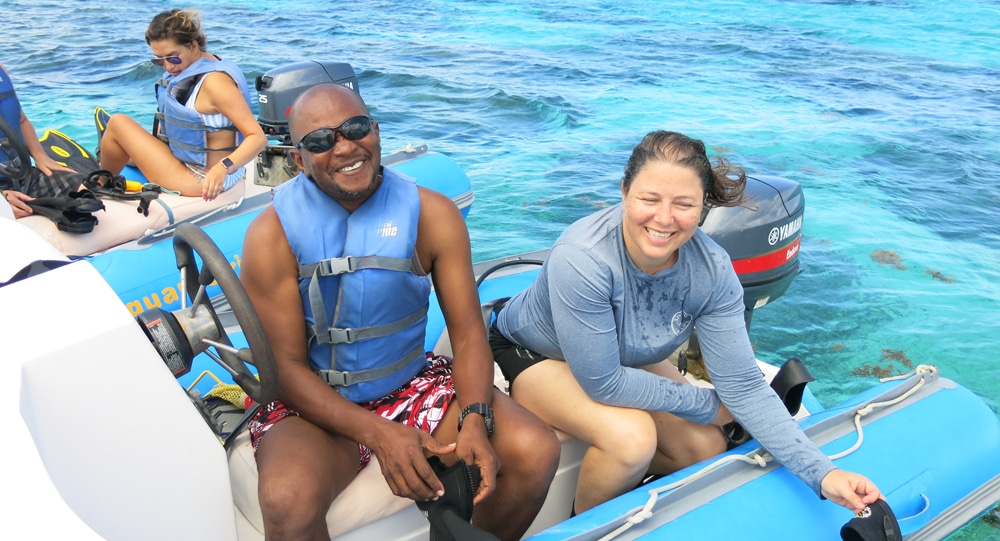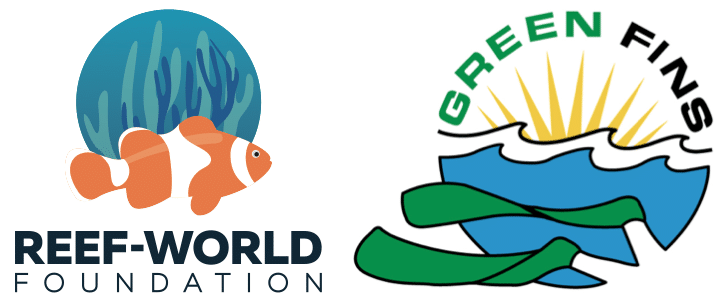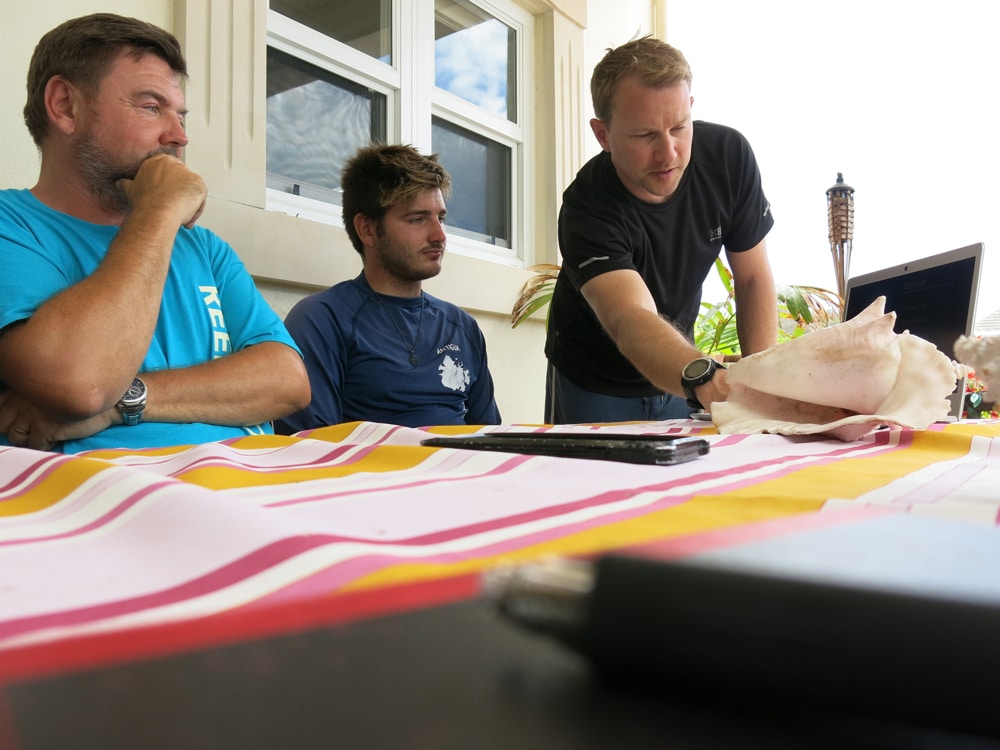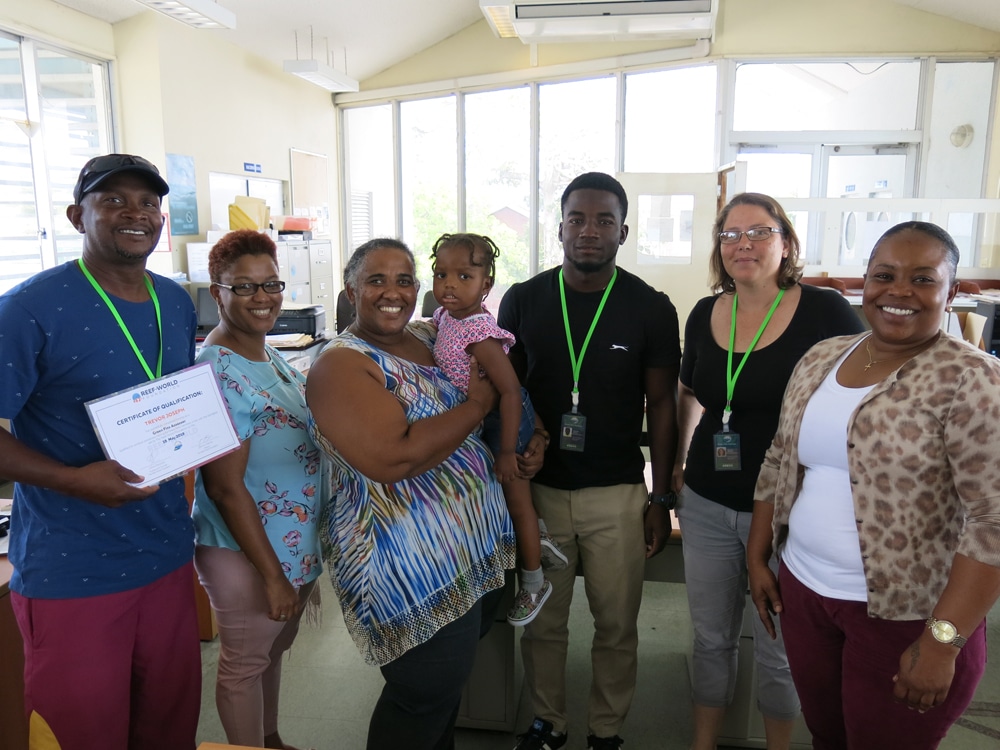Marine Life & Conservation
Antigua & Barbuda Implements Environmental Standards for Diving & Snorkelling

 The Green Fins initiative hopes to reach 10,000 tourists in the next year.
The Green Fins initiative hopes to reach 10,000 tourists in the next year.
The Reef-World Foundation – the international coordinators of Green Fins – is pleased to announce Antigua and Barbuda has become the first English speaking country in the western hemisphere to implement the Green Fins initiative. The country is the 10th government worldwide to officially adopt Green Fins and the second in the Caribbean.
Green Fins is a UN Environment initiative, internationally coordinated by The Reef-World Foundation, which aims to protect and conserve coral reefs through environmentally-friendly guidelines to promote a sustainable diving and snorkelling tourism industry.
Antigua and Barbuda, which has a population of just 100,000, received 285,000 overnight visitors and 1,000,000 cruise ship tourists in 2018. It is estimated there are over 30 businesses which provide either snorkelling or diving activities to these tourists. Reef-World hopes the initiative will significantly reduce the environmental impact on coral reefs by reaching 10,000 tourists in the next year.
The country now has a national team of 2 senior Green Fins Network leaders, 3 Green Fins assessors and 3 dive schools joining the global network of more than 560 trained and assessed Green Fins member dive and snorkel operators. Following a week of training by Reef-World, a national team comprised of the Ministry of Tourism and the Fisheries Division are now certified to recruit, train and conduct assessments of new Green Fins members in the country. This involves providing training about the ecology and threats to coral reefs, simple and local everyday solutions to these threats and Green Fins’ environmental standards to dive and snorkel operators.
The newly trained Green Fins Assessors will be carrying out robust assessments to evaluate the environmental impact of dive and snorkel operators and providing one-to-one consultation to help the business develop and implement best practice to improve the sustainability of the marine tourism industry. The individual feedback and support provided – which includes practical, low-cost alternatives to common threats to the marine environment such as anchoring, provision of single use plastics such as plastic bottles and lack of awareness to existing rules and regulations – is based on each company’s area of highest negative impact on the reef, as determined by the assessment.
Green Fins provides the only internationally recognised environmental standards for the diving and snorkelling industry and has a robust assessment system to measure compliance. Reducing diving and snorkelling-related damage to sensitive marine ecosystems, including coral reefs, helps to make them more resilient to other local and wider stressors, such as over fishing or run-off from land containing pollutants and plastic debris as well the impacts from climate change, such as rising sea temperatures.
The newly qualified Green Fins assessors, who are now certified to conduct assessments of Green Fins dive centres in Antigua and Barbuda, are Trevor Joseph – Fisheries Division, Sophia Steele – Environmental Awareness Group / Fauna and Flora International and Akeem Daley – Ministry of Tourism. The dive operators who have already been trained and certified by the Green Fins initiative are: Antigua Reef Riders, Dive Carib and Jolly Dive. There has also been significant interest from other operators who have signed the Membership form and are looking forward to their training and assessment.
The implementation of Green Fins in Antigua and Barbuda was made possible through a partnership with the ethical cosmetic company Caudalie, facilitated by the 1% for the Planet movement. In addition to Caudalie helping the environment by dedicating 1% of its global sales to funding reforestation projects, the company has recently released a new reef-safe sunscreen range. By creating a range of sun care products which do not include the harmful chemicals Oxybenzone and Octinoxate, Caudalie is helping to increase the resilience of coral in areas of high tourism.
JJ Harvey, Director at The Reef-World Foundation, said: “We’re delighted to have received the funding from Caudalie that now allows us to implement Green Fins in Antigua and Barbuda and ensure the sustainability of both the programme and the marine tourism industry. Tourism has been growing steadily for several years and the government has shown a strong desire to pro-actively protect the country’s coral reefs and marine life through the implementation of Green Fins’ best practices and standards. This funding that now makes expansion into Antigua and Barbuda possible will not only significantly improve the diving and snorkelling industry’s conservation impact in the region but is also a huge step in the global expansion of the Green Fins network.”
Hon. Charles Fernandez, Antigua and Barbuda’s Minister for Tourism and Economic Development, said: “This is a tremendous opportunity. I really applaud the initiative. I congratulate the fisheries department for collaborating with us. It is very important for tourism but even more it is important for us as a people.”
Vashti Casimir, Antigua and Barbuda’s Senior Tourism Officer Responsible for Sustainable Tourism, added: “We’re hoping that through this programme we’ll have more diving and snorkelling businesses coming on board to ensure the practices across that industry remain environmentally friendly.”
Tricia Lovell, Deputy Chief Fisheries Officer at the Fisheries Division, said: “We recognise our coral reefs are under a myriad of threats; not just from use but also from larger issues like climate change and so we figured it would be best to look at ways of improving the way we use the system. This week is just the start and a lot can come out of it and benefit the marine environment.”
The funding to implement Green Fins in Antigua and Barbuda has been provided by the French cosmetic company Caudalie. The company has recently partnered with Reef-World through the 1% for the Planet movement thanks to consultative advice Caudalie received from PUR Project.
For more information, please visit www.reef-world.org or www.greenfins.net.
Marine Life & Conservation
Paul Watson Released as Denmark Blocks Japan’s Extradition Bid

Renowned anti-whaling activist Paul Watson has been released from custody in Greenland after spending five months in detention. Denmark’s Justice Ministry rejected Japan’s request for his extradition, citing insufficient guarantees that his time already served in custody would be credited against any potential sentence.
The 74-year-old Canadian-American was arrested on July 21 in Nuuk, Greenland’s capital, when his ship docked to refuel. His arrest was based on a 2012 Japanese warrant related to a 2010 encounter in Antarctic waters. Japan alleged Watson obstructed operations and caused damage to a whaling research ship during efforts to disrupt illegal whaling. Watson has consistently denied these claims, maintaining his commitment to marine conservation.
Denmark, which oversees extradition matters for Greenland, concluded that while the legal conditions for extradition were met, the lack of assurances from Japan regarding time-served credit made extradition untenable.
In a video shared by his foundation, Watson expressed gratitude and relief, saying, “After five months, it’s good to be out… and good to know they’re not sending me to Japan.” He added that the most difficult part of his time in custody was being separated from his two young sons.
Watson is a pioneering figure in marine conservation, known for founding the Captain Paul Watson Foundation in 2022 after decades of activism with the Sea Shepherd Conservation Society. His bold efforts to defend marine life have earned him widespread support, including from celebrities and conservationists. His work has also been featured in the acclaimed reality TV series Whale Wars.
Watson’s lawyer, Jonas Christoffersen, praised the decision, stating, “We are happy and relieved that Paul Watson is now free.” He added that Watson is eager to reunite with his family and continue his vital work.
The arrest occurred while Watson’s vessel, the M/Y John Paul DeJoria, was en route to the North Pacific with a team of 26 volunteers to intercept a Japanese whaling ship. His foundation described the arrest as politically motivated and emphasized that Watson’s actions were focused on ending illegal whaling practices.
Japan resumed commercial whaling in 2019 after leaving the International Whaling Commission, asserting that whale meat is a cultural tradition. Conservationists, however, continue to challenge these practices, highlighting their impact on marine ecosystems.
Despite the challenges, Watson remains steadfast in his mission to protect marine life and bring attention to whaling practices. His dedication to ocean conservation has made him a globally respected advocate for the environment.
Marine Life & Conservation
12 Days of Zero-Waste Fish-mas

This holiday period, the Marine Conservation Society, the UK’s leading ocean membership charity, invites you to make some simple changes to eating fish this Christmas to help our seas.
Dr Kenneth Bodles, Head of Fisheries and Aquaculture at the Marine Conservation Society, said, “During the festive season, our consumption increases, but so does waste. Sustainability isn’t just about where food comes from – it’s also about how you use it. By reducing waste and making the most out of your seafood, you’re not only taking steps to be more ocean-friendly, but can also help to cut costs during what is often one of the most expensive times of the year”.
The Marine Conservation Society has compiled twelve tips on how to consume seafood sustainably with zero-waste this Christmas:
Buy whole fish instead of fillets
Instead of fillets, consider buying whole fish such as salmon, hake, or lemon sole. By adopting a “nose to tail” approach with cooking, whole-baked fish not only feeds a crowd, but also helps to minimise waste and maximise sustainability by using up every part of the animal, including bones, skin, and fat.
Make fish stock
Leftover fish bones or shells can be put to good use by boiling them to make a nourishing fish stock or bisque. This can be frozen and preserved for later use and makes for a flavourful base in a soup.
Make your own fish pâté
Avoid waste by turning leftover fish, such as smoked mackerel or salmon, into a delicious pâté by blending with cream cheese and lemon. Perfect when paired with crackers.
The sustainability of salmon and mackerel varies depending on where and how it is caught or farmed. For more information on green-rated options, check the charity’s Good Fish Guide.
Buy frozen
By purchasing seafood that is frozen or vacuum-packed, this helps to reduce waste by extending the shelf life of your food.
Fish pie
If you’re wondering what to do with leftover cooked fish, why not opt for a classic fish pie with mashed potatoes, leeks, and a cheesy sauce? A sure crowd pleaser on Boxing Day.
Use the head
Don’t forget the fish head! The meat is incredibly tender and flavourful. The charity recommends a cod’s head curry or recreating Fallow’s renowned cod’s head in siracha butter.
By stretching your ingredients further, not only is this a more sustainable way to enjoy seafood, but also cost-effective by repurposing leftovers and cooking creatively.
Boxing Day brunch
Mix leftover kippers or smoked salmon with scrambled eggs for a tasty, zero-waste, Boxing Day brunch.
For best choice, make sure you buy kippers, or herring, from the North Sea and the North Irish Sea.
Zero-waste storage
A top tip from the Marine Conservation Society to avoid waste is freezing fish offcuts to save for future use.
Crisp up the skin
Even leftover fish skin can be turned into a quick savoury snack by crisping it up in an air fryer with a little olive oil and salt.
Anchovies two ways
Leftover anchovies can either be blended with butter to make a delicious anchovy butter or tossed into pasta for a hit of umami flavour.
The charity recommends opting for anchovies caught in the Bay of Biscay for best choice.
Fishcakes
For an easy, zero-waste meal, leftover seafood trimmings can be mixed with mash and fried in breadcrumbs to make fishcakes.
Pickled mussels
Try pickling mussels in 1:1 vinegar and water, with a dash of sugar for a sustainable, zero-waste snack that can be enjoyed well beyond the festive season.
Mussels farmed in the UK are a seafood superhero. Grown using low-impact methods and harvested by hand, they get all the food they need from the sea around them. This makes them one of the most sustainable, ocean-friendly, and cost-effective seafood options.
Players of People’s Postcode Lottery have raised £6.6M towards the Marine Conservation Society’s vital work in making seafood more sustainable.
Laura Chow, Head of Charities at People’s Postcode Lottery, said: “Fish is a festive favourite for many, but making sustainable choices when it comes to how we buy and eat seafood makes all the difference for our ocean. Support from players of People’s Postcode Lottery has helped the Marine Conservation Society further its sustainable seafood work, so that we can all enjoy healthier, better protected seas.”
The Marine Conservation Society encourages you to make sustainable seafood choices a year-round habit, not just for Christmas. To check how sustainable the seafood on your plate is, you can visit the charity’s Good Fish Guide. The Guide helps consumers and businesses identify the most sustainable seafood using a simple traffic light system, based on where and how species are caught or farmed. Green is the best choice, amber means improvements are needed, and red indicates fish to avoid buying.
Zero-waste gift idea
Why not embrace a zero-waste Christmas by gifting a membership to support marine conservation? It’s a meaningful, low-waste gift that helps protect our ocean for generations to come. Memberships start from as little as £5 a month – the price of a sandwich and drink from your local coffee shop.
Find the latest sustainable seafood advice for wild-caught and farmed seafood on the Good Fish Guide, downloadable to your phone from www.mcsuk.org/goodfishguide.
-

 News2 months ago
News2 months agoIconic SS United States to become the World’s Largest Artificial Reef
-

 News3 months ago
News3 months agoBook Review – 52 Assignments: Underwater Photography
-

 Gear News3 months ago
Gear News3 months agoDYNAMICNORD – New German diving brand enters the British market
-

 News3 months ago
News3 months agoExploring Cenote El Pit: A Diver’s Dream
-

 Gear News3 months ago
Gear News3 months agoTry BARE drysuits (and maybe even win one!) this Friday with Sea & Sea at North West Dive Fest
-

 Marine Life & Conservation3 months ago
Marine Life & Conservation3 months agoBook Review: Coral Triangle Cameos
-

 Blogs2 months ago
Blogs2 months agoDive the Egyptian Red Sea this Autumn with Regaldive
-

 News3 months ago
News3 months ago2024 Ocean Art Underwater Photo Competition Announced





